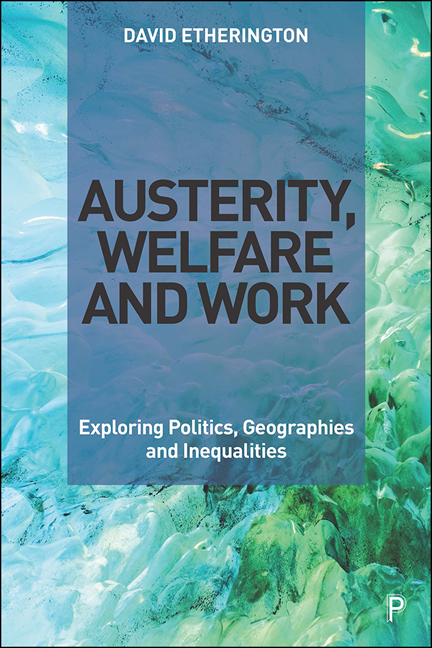Book contents
- Frontmatter
- Dedication
- Contents
- List of Tables and Box
- List of Abbreviations
- Notes on the Author
- Acknowledgements
- Preface
- 1 Introduction: the Crisis and Austerity Neoliberalism
- 2 Conceptualising Austerity, Welfare and Employment Relations
- 3 Embedding Neoliberal Austerity: from New Labour to the Conservative Government
- 4 Resisting Welfare Reforms and Work-First Policies
- 5 ‘Devolving’ Welfare Policies in Greater Manchester’s Precarious Economy
- 6 Challenging Welfare Conditionality and Insecure Work
- 7 Towards a more Inclusive Labour Market: Lessons from Denmark
- 8 Conclusions: Progressive Alternatives to Austerity
- Notes
- References
- Index
2 - Conceptualising Austerity, Welfare and Employment Relations
Published online by Cambridge University Press: 10 March 2021
- Frontmatter
- Dedication
- Contents
- List of Tables and Box
- List of Abbreviations
- Notes on the Author
- Acknowledgements
- Preface
- 1 Introduction: the Crisis and Austerity Neoliberalism
- 2 Conceptualising Austerity, Welfare and Employment Relations
- 3 Embedding Neoliberal Austerity: from New Labour to the Conservative Government
- 4 Resisting Welfare Reforms and Work-First Policies
- 5 ‘Devolving’ Welfare Policies in Greater Manchester’s Precarious Economy
- 6 Challenging Welfare Conditionality and Insecure Work
- 7 Towards a more Inclusive Labour Market: Lessons from Denmark
- 8 Conclusions: Progressive Alternatives to Austerity
- Notes
- References
- Index
Summary
Introduction
The introductory chapter outlined why it is important to view welfare and industrial/employment relations as inextricably interlinked. This link was highlighted in the work by Esping-Andersen, who identified the association between organised labour and redistributive welfare states. This perspective is influenced by power resource theory, which also has its origins in Marxist political economy on the nature of class struggle and welfare state formation (Ginsburg, 1979). Drawing on this approach, I will analyse how changes to employment relations will impact on welfare and vice versa. As Greer (2016: 170) notes: ‘Studying ALMPs (Active Labour Market Policies) critically can enrich work and employment research in a few ways. Market discipline translates into workplace discipline through the well-known mechanism of insecurity, which affects both the precariat and workers in stable employment.’ This chapter extends this argument to state that a focus on industrial relations helps us to understand how the erosion of employment rights, which has been a central feature of neoliberalism, will impact on welfare claimants.
The chapter is comprised of three parts. The first part outlines a conceptual framework for understanding the relationship between welfare and employment relations from a state theoretical perspective. It describes how labour movements are a crucial factor in welfarestate building, drawing largely on Esping-Andersen's framework. The second part explores general trends in the restructuring of the state in developed capitalist countries in the context of the global economic crisis. In this part also, I attempt to illustrate the links between welfare and employment relations in relation to an analysis of broad changes in what is termed ‘austerity neoliberalism’. The final section analyses the role of agency and class struggle, including the role of trade union and social movements, and the way these negotiate and contest neoliberalism.
The capitalist welfare state
Welfare, social reproduction and the reserve army of labour
Drawing on Marxist theory, the state can be conceptualised as a social relation; the state is a site, product and generator of struggle, and its spatial form is determined by the condensation of political forces that are represented in and through the state apparatus. The state has differential effects on various political and economic strategies in a way that some are more privileged than others but, at the same time, it is the interaction among these strategies that results in such exercise of state (and class) power (Jessop, 2016; Etherington and Jones, 2018).
- Type
- Chapter
- Information
- Austerity, Welfare and WorkExploring Politics, Geographies and Inequalities, pp. 19 - 46Publisher: Bristol University PressPrint publication year: 2020



